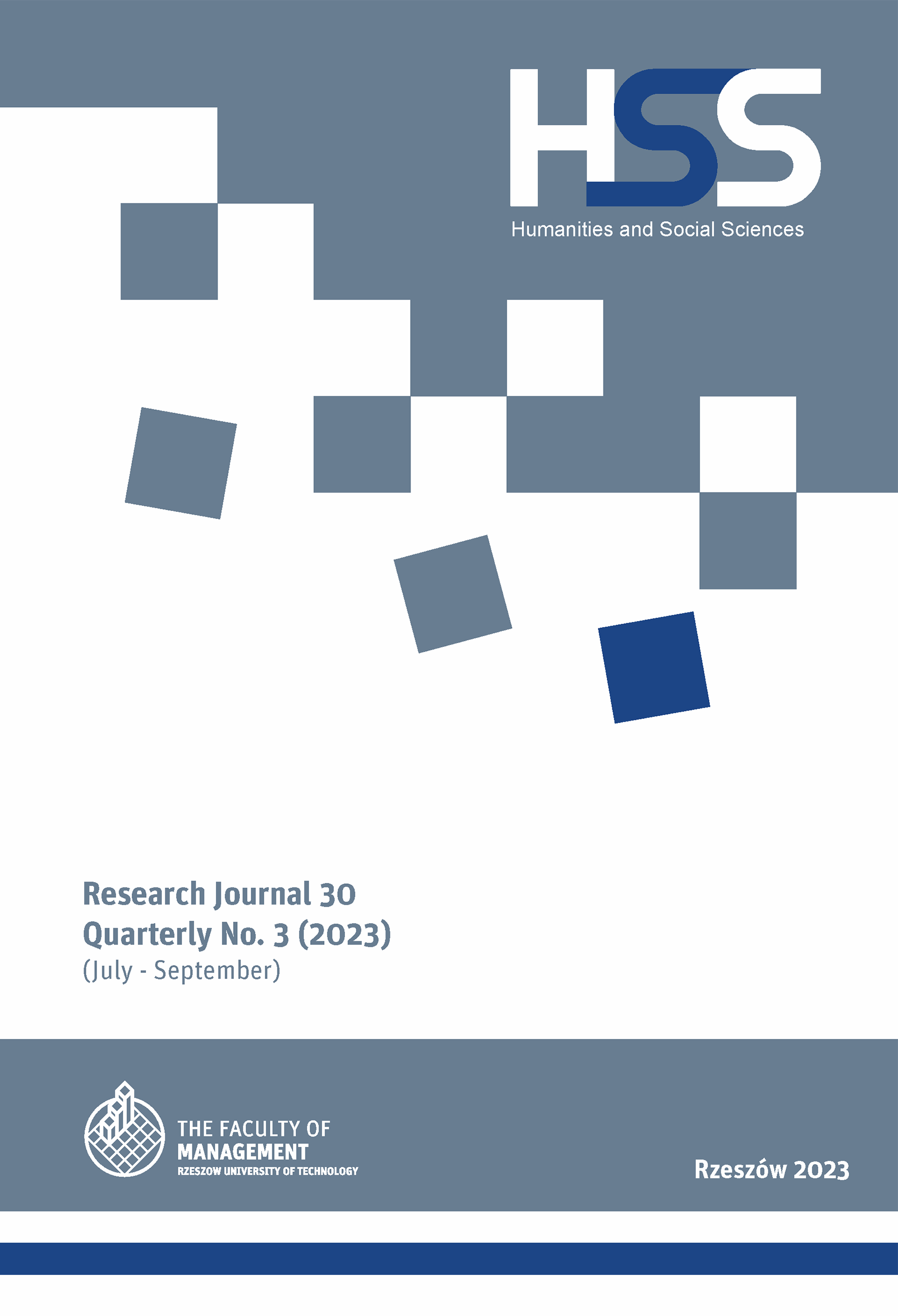Abstract
This article presents the results of an analysis of entrepreneurial intentions and attitudes among children of Generation Alpha (born after 2010). The study is based on a diagnostic survey of 252 primary school students in the West Pomeranian Voivodeship. The results show that even though students, as a rule, have business ideas and positively assess the creation of their own business, they do not often think about creating their own business in the future and are less likely to associate their future with entrepreneurship. The analysis shows that there is a connection between entrepreneurial intentions and attitudes and the socio-demographic profile of respondents. The results can be used to develop new approaches to the organization of entrepreneurial education in primary schools, and to raise children’s awareness of the prospects of running their own businesses.
References
Ajzen, I. (1991) The theory of planned behavior. Organizational Behavior and Human Decision Processes, Vol. 50, Issue 2. DOI: 10.1016/0749-5978(91)90020-T.
—— (2002). Perceived behavioral control, self-efficacy, locus of control, and the theory of planned behavior. “Journal of Applied Social Psychology”, 32(4). DOI: 10.1111/j.1559-1816.2002.tb00236.x.
Ajzen, I., Driver, B.L. (1992). Application of the theory of planned behavior to leisure choice. “Journal of Leisure Research”, 24(3). DOI: 10.1080/00222216.1992.11969889.
Aliedan, M.M., Elshaer, I.A., Alyahya, M.A., Sobaih, A.E.E. (2022). Influences of University Education Support on Entrepreneurship Orientation and Entrepreneurship Intention: Application of Theory of Planned Behavior. “Sustainability”, 14(20). DOI: 10.3390/su142013097.
Amofah, K., Saladrigues, R. (2022) Impact of attitude towards entrepreneurship education and role models on entrepreneurial intention, “Journal of Innovation and Entrepreneurship”, 11. DOI: 10.1186/s13731-022-00197-5.
Barba-Sánchez V., Atienza-Sahuquillo C. (2017). Entrepreneurial motivation and self-employment: evidence from expectancy theory. “International Entrepreneurship and Management Journal”. DOI: 10.1007/s11365-017-0441-z.
Barba-Sánchez V., Mitre-Aranda M., Brío-González J., (2022) The entrepreneurial intention of university students: An environmental perspective. “European Research on Management and Business Economics”, Vol. 28, Issue 2. DOI: 10.1016/j.iedeen.2021.100184.
Borgiasz-Stepaniuk, M. (2019). Postawy przedsiębiorcze wśród młodzieży. „Przedsiębiorczość – Edukacja”, 15(1). DOI: 10.24917/20833296.151.4.
Boyd N., Vozikis G. (1994) The influence of self-efficacy on the development of entrepreneurial intentions and actions. “Entrepreneurship Theory and Practice”, 18(4). DOI: 10.1177/104225879401800404.
Fidan, N., Argıç, T. (2022). Entrepreneurship Tendencies of Primary School Students and Variables Affecting Their Entrepreneurial Tendency. “Discourse and Communication for Sustainable Education”, 13(2). DOI: 10.2478/dcse-2022-0017.
GEM (Global Entrepreneurship Monitor) (2022). Global Entrepreneurship Monitor 2021/2022 Global Report: Opportunity Amid Disruption. London: GEM.
Goyal V. (2020, Jul 24). Gen Alpha and Learning in the New World [Blog post] [Access: 22.03.2023]. Access on the internet: https://www.entrepreneur.com/en-in/technology/gen-alpha-and-learning-in-the-new-world/353752.
Janas, M. (2020). Postawy wobec przedsiębiorczości uczniów w młodszym wieku szkolnym. „Przedsiębiorczość – Edukacja”, 16(2). DOI: 10.24917/20833296.162.4.
Kibler, E. (2013). Formation of Entrepreneurial Intentions in a Regional Context. “Entrepreneurship and Regional Development”, 25(2–3). DOI: 10.1080/08985626.2012.721008.
Krueger N., Carsrud A. (1993) Entrepreneurial intentions: applying the theory of planned behaviour. “Entrepreneurship and Regional Development”, Vol. 5, Issue 4. DOI: 10.1080/08985629300000020.
Krueger N., Reilly, M., Carsrud, A. (2000). Competing models of entrepreneurial intentions. “Journal of Business Venturing”, 15(5). DOI: 10.1016/S0883-9026(98)00033-0.
Lent R., Brown S., Hackett G. (1994) Toward a unifying social cognitive theory of career and academic interest, choice, and performance. “Journal of Vocational Behavior”, Vol. 45, Issue 1. DOI: 10.1006/jvbe.1994.1027.
Li Y., Wang R., Chi C. (2022). Who is more likely to start a business? Analysis of the factors influencing undergraduates’ entrepreneurial intentions. “Front. Psychol.”, 13. DOI: 10.3389/fpsyg.2022.829955.
Liñán, F., Fayolle, A. (2015). A systematic literature review on entrepreneurial intentions: Citation, thematic analyses, and research agenda. “International Entrepreneurship and Management Journal”, 11(4). DOI: 10.1007/s11365-015-0356-5.
Lüthje C., Franke N. (2003) The “making” of an entrepreneur: testing a model of entrepreneurial intent among engineering students at MIT. “R&D Management”, Vol. 33, Issue 2. DOI: 10.1111/1467-9310.00288.
Maheshwari, G., Kha, K.L., Arokiasamy, A.R.A. (2022) Factors affecting students’ entrepreneurial intentions: a systematic review (2005–2022) for future directions in theory and practice. “Management Review Quarterly”, DOI: 10.1007/s11301-022-00289-2.
Michel Carter C. (2022, Mar 31). Survey: Gen-Z And Gen Alpha Place High Importance on Financial Literacy, Just Like Their Parents [Blog post] [Access: 22.03.2023]. Access on the internet: https://www.forbes.com/sites/christinecarter/2022/03/31/survey-gen-z-and-gen-alpha-place-high-importance-on-financial-literacy-just-like-their-parents/?sh=261ca51e6593.
Miranda, F., Chamorro-Meraa, A., Rubio, S. (2017). Academic Entrepreneurship in Spanish Universities: An Analysis of the Determinants of Entrepreneurial Intention. “European Research on Management and Business Economics”, 23(2). DOI: 10.1016/j.iedeen.2017.01.001.
Moberg, K., Vestergaard, L., Fayolle, A., Redford, D., Cooney, T., Singer, S., Sailer, K., Filip, D. (2014). How to Assess and Evaluate the Influence of Entrepreneurship Education: A Report of the ASTEE Project with a User Guide to the Tools. The Danish Foundation for Entrepreneurship – Young Enterprise [Access: 22.03.2023]. Access on the internet: http://ntsnet.dk/sites/default/files/ASTEE%20rapport%20juni%202014.pdf.
Nellis J. (2018, Apr 24). What does the future hold for Generation Alpha? [Blog post]. [Access: 22.03.2023]. Access on the internet: https://blog.som.cranfield.ac.uk/execdev/future-for-generation-alpha.
Porfírio, J.A., Carrilho, T., Jardim, J., Wittberg, V. (2022). Fostering Entrepreneurship Intentions: The Role of Entrepreneurship Education. “Journal of Small Business Strategy”, 32(1). DOI: 10.53703/001c.32489.
Rodrigues, M., Silva, R., Franco, M. (2021). Entrepreneurial Attitude and Intention in Higher Education Students: What Factors Matter? “Entrepreneurship Research Journal”, 20200107. DOI: 10.1515/erj-2020-0107.
Shapero, A., Sokol, L. (1982). The Social Dimensions of Entrepreneurship [In:] Kent, C.A., Sexton, D.L., Vesper, K.H., eds., Encyclopedia of Entrepreneurship. Englewood Cliffs. NJ: Prentice-Hall.
Thompson, E.R. (2009). Individual Entrepreneurial Intent: Construct Clarification and Development of an Internationally Reliable Metric. “Entrepreneurship Theory and Practice”, 33(3). DOI: 10.1111/j.1540-6520.2009.00321.x.
Winter. D. (2022, Nov 11). Generation Alpha: Everything Brands Need to Know [Blog post] [Access: 22.03.2023]. Access on the internet: https://www.shopify.com/blog/gen-alpha.
Wojtun. J., Jaworska. J., Maj. M. (2022). Przedsiębiorczość młodych Małopolan. Urząd Marszałkowski Województwa Małopolskiego [Access: 22.03.2023]. Access on the internet: https://www.obserwatorium.malopolska.pl/wp-content/uploads/2022/03/Przedsiębiorczość-młodych_raport_2022.pdf.
Yan, J., Huang, T., Xiao, Y. (2023). Assessing the impact of entrepreneurial education activity on entrepreneurial intention and behavior: role of behavioral entrepreneurial mindset. “Environmental Science and Pollution Research”, 30. DOI: 10.1007/s11356-022-23878-w.


